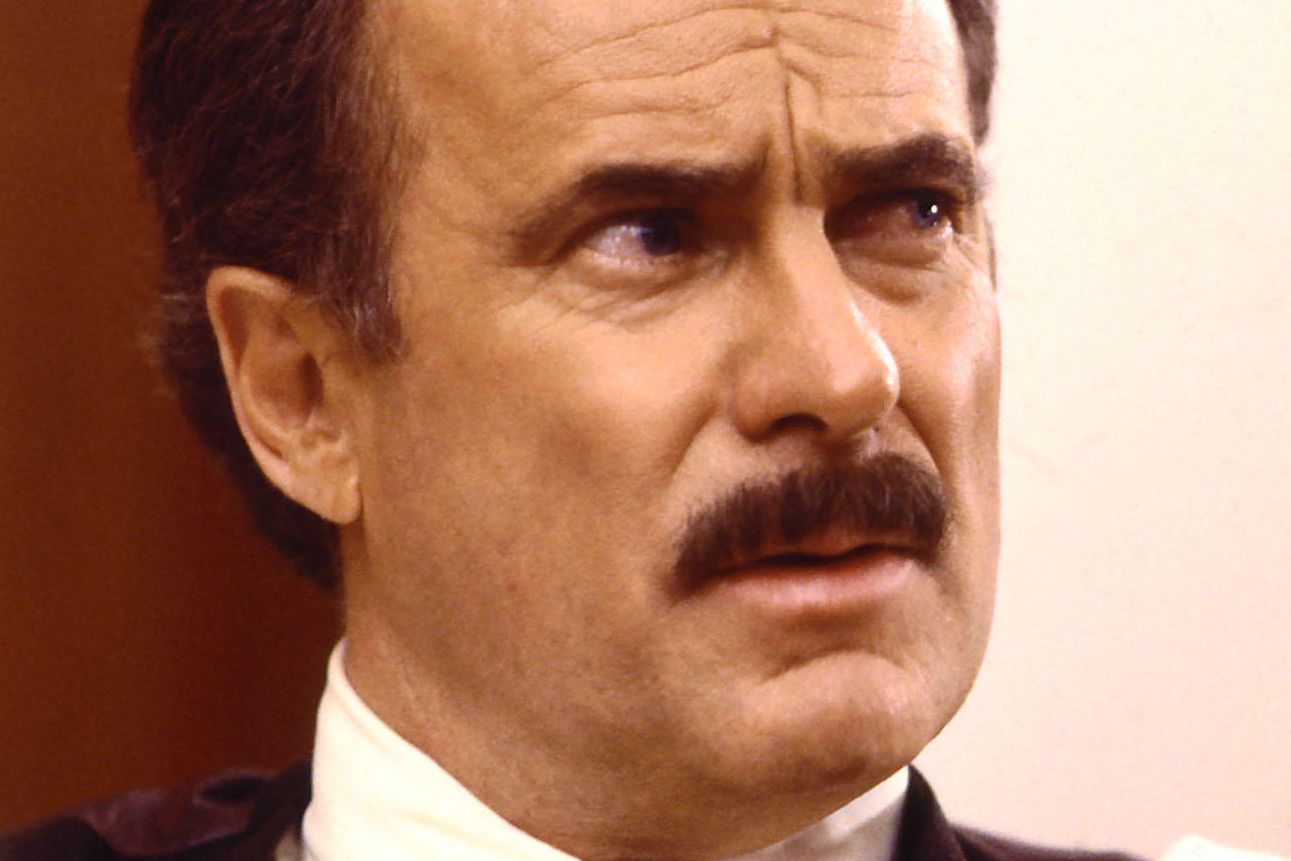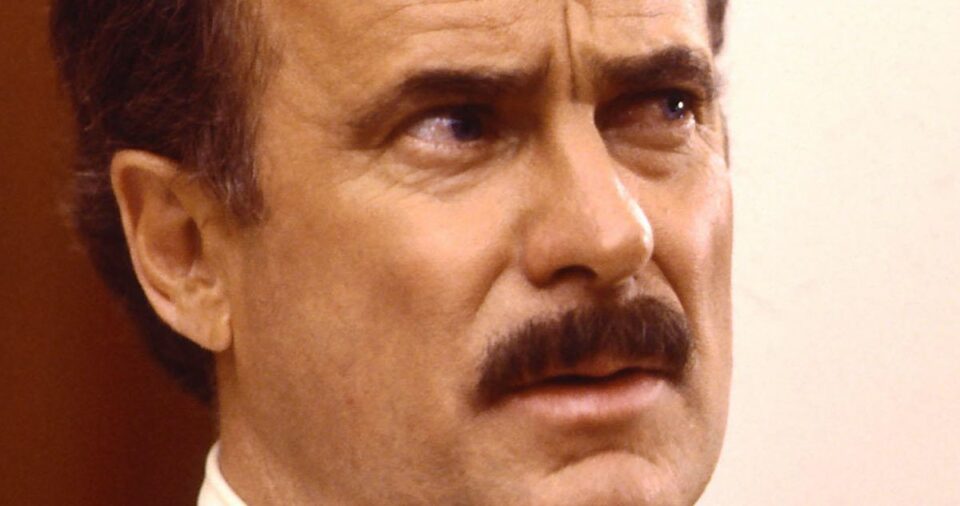
You don’t have to be likable to be fun. A lot of actors resist this truth. Dabney Coleman, who died this weekend at 92, embraced it. From the 1970s through the end of the millennium, if there was a hot script with a meaty role for somebody who was good at playing slime bags, cowards, betrayers, bastards, rat bastards, sons of bitches, and pains in the ass, Coleman probably booked it, and if he didn’t, his coffee stains were probably on it. After a while, it was even called the Dabney Coleman Part, also offered to Paul Gleason or William Atherton (who were both in Die Hard, a film with multiple Dabney Coleman parts yet, strangely, no Dabney Coleman).
Coleman’s signature role was the sexist boss in the 1980 smash 9 to 5:a man so loathsome, pompous, and useless that each of the film’s three put-upon leads, played by Dolly Parton, Jane Fonda, and Lily Tomlin, got her own scene in which she turns the tables on him. Every time, the audience cheered. (His character is repeatedly called, in rapid-fire cadence, a “sexist, egotistical, lying, hypocritical bigot,” and in one scene, Parton threatens to pull a pistol from her purse and turn him “from a rooster to a hen in one shot.”) In advance of the film’s 40th anniversary re-release, Coleman told interviewers that when he read the script, “I knew it was for me.” The first person to identify a Dabney Coleman Part was Dabney Coleman.
Before 9 to 5 made him a movie-posters name, he played the hard-driving coach of Robert Redford’s hotshot skier in Downhill Racer and the fire chief in the 1974 disaster film The Towering Inferno,who was mainly there to be a foil for the heroes (Gleason and Atherton’s Die Hard characters were his descendants): Steve McQueen’s heroic firefighter and Paul Newman’s architect. After we got to know him, he tormented the Muppets in The Muppets Take Manhattan (1984). He was Martin Short’s slimy boss in the infamous film Clifford (1994). He played the boss who barks orders and fumes and sputters at the title character of Inspector Gadget (1999). He was the crotchety banker Mr. Drysdale in the film version of The Beverly Hillbillies (1993) and the greedball who cheers whenever another independent store bites the dust in You’ve Got Mail (1999). In WarGames (1983), he was the snarling, insinuating Air Force computer-science officer who grilled Matthew Broderick’s young hacker like a bratwurst, then disintegrated when it seemed as if Armageddon were nigh. The millennial generation’s gateway to Coleman appreciation was probably Nickelodeon’s cartoon series Recess, premiering in 1997, in which he played the principal Peter Prickly, a reflexive authoritarian with a soft center. His greatest late-in-life monster role was as Commodore Louis Kaestner, a.k.a. the Commodore, on HBO’s Boardwalk Empire, who makes Noah Cross in Chinatown seem like a comparatively well-adjusted guy. The mentor of Steve Buscemi’s civic leader and gang boss, the Commodore is a racist and misogynist bully who’s so abusive that his own housekeeper tries to poison him, and a rapist and pedophile who impregnates one of the show’s heroines, Gillian Darmody (Gretchen Mol), as a child.
Coleman was from Austin, Texas, and had the drawl to prove it. He was also a fascinating actor whose technique and temperament straddled two eras. He was born in 1938, too early to be called a boomer. His performances could have just as easily fit into the early part of the century as the rest of it. Like many actors of his generation, he was Meisner trained and worshipped the Method stars of the 1950s, but there was a hard, old-school simplicity to his work, especially in comedy parts. You could imagine him as a creep in a late-1940s Cary Grant movie. But when his characters started to lose it and crack apart at the seams, he showed a little bit of that Charles Grodin–Albert Brooks willingness to wallow.
In 1983, he got an entire sitcom built around him, Buffalo Bill, in which he played a toxic narcissist of a TV talk-show host who steamrolled other people every waking moment of his life. During a local-news interview that year, the host read aloud from a newspaper review of the premiere that described Bill as “a hypocrite, a coward: a misogynist; a grasping, rude, vain person. He’s the hilarious, the most outrageous character on television: truly an unsentimental cad.” Coleman deadpanned, “She lied. I never touched her,” then looked away for a minute as if dissociating and said quietly, “I remember that interview.”
Audiences were repulsed by the show and it was canceled after a year, but TV scholars now discuss it as the first major sitcom whose lead was an antihero with few redeeming qualities. Four years later, Coleman did another sitcom, The Slap Maxwell Story, in which his title character, a newspaper sportswriter, was sarcastic, aggressive, and full of himself, but had a dose of heart. That one was canceled after a year, too.
We don’t think twice about a show like that, or characters like that, today. Married … With Children hit Fox the same year that Slap Maxwell debuted on CBS, and the jerks of Seinfeld arrived soon after. An unlikable lead ceased to be a dealbreaker. It’s possible that Coleman’s high-profile flops helped get audiences used to the idea that a lead doesn’t have to be likable to be compelling. You could make the case that every such lead is ultimately a variation of a Dabney Coleman part. They’re all either Buffalo Bill or Slap Maxwell. David Brent is Buffalo Bill. Michael Scott is Slap Maxwell.
Coleman took these sorts of characters as far as they could go in whatever medium contained them. “I don’t take credit for being the first,” he told Vulture a few years ago. “I would have to give that to Carroll O’Connor. But sure, I was one of the first. It’s fun playing those roles. You get to do outlandish things, things that you want to do, probably, in real life but you just don’t because you’re a civilized human being … I couldn’t imagine anyone not loving playing those parts.” He found things in scripts — pockets of misery, hints of perversity, pools of darkness — that the writers might not have had the temerity to imagine, tore them open, and spread discomfort across the screen like a brown oil slick. There were so many little variations in the Dabney Coleman parts that somehow you never thought about his being typecast, even if he was. No matter how low the characters went, there was always the possibility that they could go lower. In his no-fuss way, he was a dangerous actor.
Related
- Boardwalk Empire’s Dabney Coleman on His Career of Playing Hall of Fame Assholes
Matt Zoller Seitz , 2024-05-20 17:00:04
Source link


